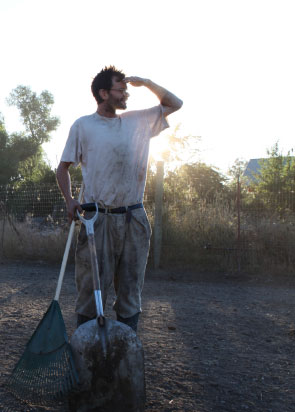Schedule: Typically, March through June is very busy as the apprentices become familiar with the farm and one another, and learn how to work together to plant the spring crops, begin the CSA harvests, host school class visits and the Memorial Day CSA work weekend and potluck, and travel to attend BDANC training weekends and the CSA General Meeting and Potluck in San Francisco. A tremendous learning curve takes place during this time—the days are full.
During June through August we focus more on the garden, with summer crop succession plantings, weeding, vegetable harvesting, the grain harvest, and the fall plantings of winter vegetables. BDANC
training continues, but there are no school class visits during the summer period. During September through November we see the end of the garden plantings. Horse field work for planting the next year’s grain, hay, and pasture crops intensifies, and we host a few more class visits, as well as the fall CSA work weekend and potluck and the quarterly Biodynamic Association meeting. Fall is also the time of year when we try to free up time to hold organized training workshops during the workday. We can use this time as an opportunity to learn and practice harnessing, driving, and using the workhorses, if that is of general interest, or take up other subjects that are of particular interest.
During the growing season, the operation of the farm on its present scale requires the directed full-time effort of about 5 people. If the apprentices gain skills and apply themselves as the season progresses, we will be able to accomplish the critical work of the farm and free up more time toward the end of the season to focus on training workshops or other areas of particular interest. It is well to take up this goal from the beginning, and at the same time realize that there can always be things beyond our control. When unplanned situations arise, we will have to deal with them, which can upset our plans to a greater or lesser degree.
Application: Anyone who sincerely desires to learn biodynamic agriculture and to partake in caring for a farm will be considered for an apprenticeship. Since 1987, people of all ages from the U.S. and abroad have joined us for study periods of up to 3 years. Ideally, we are seeking people who have had some farming experience, but the only absolute prerequisite for application is a willingness to participate fully in a hands-on experience of farm life for the duration of one’s involvement.
With regard to the length of a w ork-study term, both farm and apprentice are best served by a full-season (March to December) commitment; a second year is recommended for those preparing for an agricultural venture of their own and for those wishing to focus on draft horse field work. Second-year apprentices may take on particular projects or additional responsibilities while continuing to participate with the first-year apprentice activities. Occasionally, there are a few short-term farm steward openings in the summer or fall.
If you are selected for a term of study with us, we pledge to support you in your training to the best of our ability while we balance meeting the farm’s production requirements. In return, we ask that you make a commitment to the learning process with a willing and cheerful attitude toward your work and study, that you remain respectful of the way in which our family farm is operated, and that you help to maintain the farm organism that is our educational facility.
Please print, complete, and send us an application. We have found that it is beneficial for prospective apprentices to visit with us for a few days to a week prior to making a commitment for the season. After we receive your application, we will get in touch with you by phone or email to discuss further questions you may have and to arrange a time for you to visit the farm.



